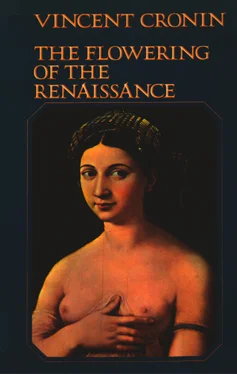Virgo sylvestrum domitrix ferarum ,
Quae pharetratis comitata nymphis ,
Cynthium collem peragras, nigrique
Silvam Erymanthi….
Maiden, tamer of the wild beasts of the woods,
Who, in the company of the quiver-bearing nymphs,
Range Cynthius’s hill and the forest
Of black Erymanthus….
Another remarkable poet is Zaccaria Ferreri, abbot of Monte Subasio. He had actively supported the Council of Pisa, but Leo was not one to bear a grudge, and he commissioned Ferreri to replace the medieval hymns of the Breviary, whose language and rhymes were deemed inelegant, with new ones in classical Latin. Ferreri published his versions in 1525. For the feast of Corpus Christi, instead of Thomas Aquinas’s Pange Lingua , he offered beautiful, closely knit sapphics, of which this is the last stanza:
Zographi non ars sapientis ulla
Fingere, aut ullus penetrare vivens
Hoc valet sacrum, neque te triforme
Numen Olympi.
Artist’s brush is powerless to paint
And mortal mind to probe this act,
Or to fathom you, threefold
God of Olympus.
The best of the Latin poets patronized by Leo is Marco Girolamo Vida, who was born in Cremona about 1490 and came to Rome with verses on chess and silkworms. Leo saw that the young poet was capable of more than these trifles. Wishing to be an Augustus to a new Virgil, he commissioned Vida to write a Christian Aeneid. He also gave Vida the necessary means, naming him prior of a quiet and beautiful monastery, S. Silvestro in Frascati. There Vida wrote his Christias , six books of chiselled Latin hexameters recounting the life of Christ from Bethlehem to his death on Calvary. It is a sincere work—Vida was a holy priest—with none of the pagan trappings which Erasmus thought disfigured the De Partu Virginis by Sannazzaro of Naples, and it remains the finest Latin poem of the sixteenth century.
Latin prose Leo also encouraged. It was at the Pope’s special request that Pietro Martire d’Anghiera, Queen Isabella’s Lombard chaplain, wrote his important account of thirty-four years of ocean discovery, Decades de orbe novo , first published in full in 1516, and it was the Pope who urged the converted Moslem, Leo the African, to write a description of his native continent. By such activities as these, by his example and patronage Leo did more than anyone to establish the language of Cicero’s Rome as a vehicle for contemporary writing. During his reign Italian poets in France, Spain and England were writing Latin verses and encouraging others to do so. There seemed a real chance that Latin-writing humanists could draw together the nations of Europe.
Leo’s literary patronage extended also to the vernacular, and to a sphere which no previous Pope had entered, namely the theatre. As a boy in Florence Leo had acted in at least one St John’s Day play, and his tutor Poliziano had written in Orfeo the first secular play in Italian ever to be performed. Ferrara had been staging Plautus and Terence since 1486, and vernacular comedy since around 1500. Mantua and Urbino also staged plays, and it was evident to Leo that if Rome were to take the intellectual lead in Italy she must do no less. When his closest friend among the Cardinals, Bernardo Dovizi da Bibbiena, wrote a comedy suggested by Plautus’s Menaechmi , Leo decided, the year after his accession, to stage it.
The Calandria is set in Rome and its plot, like Shakespeare’s Comedy of Errors , turns on identical twins. Lidio and Santilla, refugees from the Turk, arrive in Rome by different routes. Santilla, for safety, has disguised herself as a man, while Lidio, in order to visit his sweetheart, poses as Santilla, whom he believes dead. This gives rise to predictable doubles entendres and mistakes of identity. The play takes its name from Calandro, the gullible husband of Fulvia, with whom Lidio is in love. Fulvia asks Rufo, a wily magician, to smuggle Lidio into her room. Rufo, while pretending to agree, introduces not a man disguised as a woman but a real woman. Fulvia gives vent to her rage and bewilderment. Is Lidio a hermaphrodite, or does Rufo, as Fulvia is led to believe, possess the power to alter at will a person’s sex? Finally, for a fatter fee, Rufo succeeds in introducing Lidio, dressed in woman’s clothes, to Fulvia’s room, whereat the curtain falls.
The importance of his mildly amusing play lies in its tone. Sexual love is praised as the sweetest pleasure in the world, anyone who does not enjoy it is a fool, but it is constantly being thwarted as the man in question turns out to be a woman. The constant references to changes of sex and hermaphrodites point to a general truth which Bibbiena puts into the mouth of one of his characters: ‘Everyone knows that women are so highly valued today that there isn’t a man who does not imitate them, down to becoming a woman in body and soul.’ The classical revival had titillated appetites which because of the vow of celibacy could not be satisfied, and in a predominantly masculine city this could, and often did, lead to effeminacy. Tommaso Inghirami, Vatican Librarian and one of Rome’s leading orators, whose round face and upturned eyes with a cast are familiar from Raphael’s portrait, was actually known by the name Phaedra, after playing that role in Seneca’s Hippolytus.
Another comedy, Ariosto’s I Suppositi , Leo staged in the palace of his nephew, Cardinal Cibo, in 1519. The Pope ‘took his place at the door and quietly, with his blessing, gave permission to enter, as he saw fit.’ Two thousand crowded in, causing such a crush that the Ferrarese ambassador almost had a leg broken. Leo took his place on a dais in the front row; his name was spelled out by candelabra on either side of the stage, and on the curtain, which Raphael had designed, Leo’s favourite buffoon was depicted sporting amid devils. Fifes, bagpipes, violas and comets provided gay music.
Ariosto’s play is inspired by Terence’s Eunuch and Plautus’s Captives. A young couple much in love but too poor to marry contrive to thwart the advances of a rich old suitor; after much duplicity and deceit, the hero comes into money, casts off his servant’s disguise and marries the girl who for two years has secretly been his mistress. In one scene a parasite named Pasifilio reads the hand of the suitor, Cleando. Here is a snatch of their dialogue translated by Gascoigne in The Supposes of 1566, which is sometimes described as the first English comedy worthy of the name:
Pasiphilo: O how straight and infracte is this line of life!
You will live to the yeeres of Melchisedech.
Cleando: Thou wouldst say, Methusalem.
Pasiphilo: Why, is it not all one?
Cleando: I perceive you are no very good Bibler, Pasiphilo.
Pasiphilo: Yes, sir, an excellent good Bibbelere, specially in a bottle.
At these and similar jokes Leo laughed heartily, which shocked Frenchmen in the audience. They thought it unseemly that a Pope should attend so frivolous a play.
A third comedy to be staged in Rome, at Leo’s special request, was Machiavelli’s Mandragola. A Florentine youth named Callimaco falls in love with Lucrezia, the virtuous young wife of an impotent husband, Nicia. Callimaco poses as a doctor and persuades Nicia that a potion of mandrake can cure Lucrezia’s childlessness. There is, however, one snag. The first to sleep with a woman who has taken such a potion, dies. So a stranger must be introduced for the night to Lucrezia’s bed, and Callimaco firmly intends to be that stranger. For a fee the local priest, Fra Timoteo, persuades Lucrezia to accept the outrageous plan, and next morning, after the trick has been successfully perpetrated, takes them all to church in a general mood of self-congratulation.
Читать дальше












